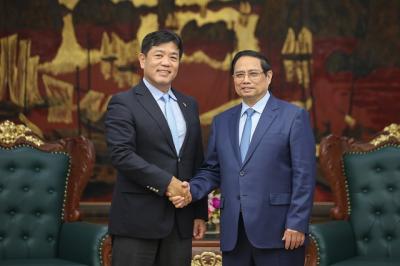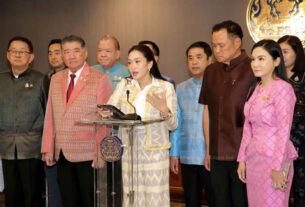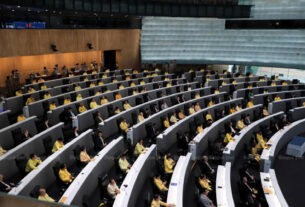Vietnam’s Prime Minister Pham Minh Chinh hosted Yukihito Honda, Chief Executive Officer of Sumitomo Corporation’s Urban Development Diversity division, in a high-level meeting that underscored Hanoi’s intent to accelerate large-scale infrastructure investment with Japan’s Sumitomo as a strategic partner. The gathering, attended by Japan’s Ambassador to Vietnam Ito Naoki, highlighted the depth of two nations’ economic cooperation, celebrated Sumitomo’s ongoing contributions, and laid out a roadmap for expanding joint projects in Vietnam’s infrastructure, industrial development parks, and smart city initiatives. The Prime Minister expressed confidence that Sumitomo’s investments have both scale and reach, generating spillover effects that drive regional growth and reinforce the comprehensive strategic partnership between Vietnam and Japan. He also emphasized that these investments are a cornerstone for sustainable development, aligning with Vietnam’s goals for green growth and economic resilience.
Meeting Highlights and Strategic Significance
The encounter between Prime Minister Pham Minh Chinh and Yukihito Honda centered on recognizing Sumitomo Corporation as a multi-sector conglomerate with a proven track record in Vietnam. The Prime Minister noted that Sumitomo’s projects in Vietnam are not isolated ventures but catalysts for broader economic activity that shape local economies and connect them to national growth. He stressed that the scale and reach of Sumitomo’s investments contribute substantially to the socio-economic development of the localities hosting these projects, while also enhancing Vietnam’s strategic partnership with Japan. This recognition reflects a broader understanding of how large, integrated infrastructure investments can create a cascading effect—improving supply chains, attracting ancillary industries, and elevating regional competitiveness.
The Prime Minister reiterated that economic cooperation remains a central pillar of the Vietnam-Japan relationship, which has now entered its second year as a robust and practical partnership. He highlighted that Japan stands out as a top partner for Official Development Assistance (ODA), labor mobility, and investment, while maintaining a leading position in trade and technology transfer. In line with this framework, he called for a accelerated and more seamless execution of ongoing projects and for an expanded portfolio of investments across strategic sectors. The emphasis on speed and efficiency reflects Vietnam’s ambition to translate policy commitments into tangible development outcomes, particularly in infrastructure, urban development, and digital transformation.
A critical point in the dialogue was the recognition of Sumitomo’s existing footprint in Vietnam’s industrial landscape. The government’s appreciation for Sumitomo’s role comes with a clear expectation that the company will continue to scale its activities with transparency, social responsibility, and adherence to regulatory standards. The Prime Minister underscored the government’s readiness to provide the necessary policy and administrative support to ensure that Sumitomo’s projects—whether in infrastructure, finance, real estate, transportation, or energy—progress smoothly. The meeting also reaffirmed the importance of the relationship’s strategic dimension, signaling a long-term commitment from both sides to deepen collaboration and maximize the developmental impact of joint ventures.
Additionally, the Prime Minister acknowledged the broader strategic context: Vietnam’s growth strategy increasingly relies on attracting multinational capital that can bring not only capital but technology, managerial expertise, and global best practices. Sumitomo’s presence—rooted in decades of operation in Vietnam—serves as a benchmark for high-quality foreign direct investment (FDI) and a model for how private sector leadership can align with public policy objectives. The dialogue thus functioned as both a confirmation of past successes and a springboard for future ventures that can help Vietnam meet its development targets while reinforcing bilateral ties with Japan.
Sumitomo’s Investment Footprint in Vietnam
Sumitomo Corporation has established a broad and influential footprint in Vietnam that encompasses multiple sectors and a portfolio of large-scale projects. One of the most notable outcomes highlighted by the Prime Minister is the attraction of approximately 6 billion USD in investments within industrial parks managed or developed by Sumitomo, a statistic that illustrates the scale of private capital Sumitomo brings to the Vietnamese economy. The corresponding job creation impact—tallying more than 90,000 jobs—speaks to the direct social and economic benefits these projects deliver, not only by providing employment but also by supporting supplier networks, local entrepreneurship, and human capital development.
The investment footprint is not limited to a single project type or location. Sumitomo’s involvement in industrial zones spans several Vietnamese provinces, reinforcing the country’s regional development strategy and helping to distribute growth beyond the major urban centers. This dispersal of investment is central to reducing regional disparities and promoting more balanced economic development across the country. The government’s acknowledgment of Sumitomo’s contributions reflects an understanding that large, diversified investments can generate wider economic spillovers, including increased regional purchasing power, the modernization of local infrastructure, and enhanced integration into regional supply chains.
From a strategic standpoint, Sumitomo’s long-standing engagement in Vietnam—marking 70 years of presence in the country—demonstrates a sustained commitment to the Vietnamese market. The company’s enduring presence signals a deep understanding of Vietnam’s regulatory environment, culture, and business ecosystem, which in turn fosters more stable and effective long-term planning for infrastructure and urban development. The Prime Minister’s remarks suggest that this enduring relationship stands ready to evolve, with the ambition to accelerate project timelines and broaden the scope of collaboration in high-priority sectors such as urban development, smart city initiatives, and advanced manufacturing ecosystems.
In terms of project diversity, Sumitomo has pursued initiatives ranging from the North Hanoi Smart City project to the development of industrial parks across Northern and Central regions, including sites in Hanoi, Hung Yen, Phu Tho, Thanh Hoa, and Quang Tri. The company’s participation in EPC (Engineering, Procurement, Construction) contracts for critical transport infrastructure—such as the elevated metro line in Ho Chi Minh City (Urban Railway Line 1)—underlines Sumitomo’s capacity to deliver complex, large-scale infrastructure that requires cross-functional expertise spanning engineering, project management, procurement, and operational readiness. Moreover, Sumitomo’s involvement in energy projects, such as the Van Phong I BOT (Build-Operate-Transfer) power plant with a capacity of 1,320 MW, showcases the company’s contribution to Vietnam’s energy security and modernization of its power sector.
Looking ahead, the government identified opportunities for Sumitomo to continue expanding its footprint in infrastructure, finance, real estate, transportation, and other high-potential areas. The Prime Minister specifically welcomed Sumitomo’s interest in new projects including Thanh Hoa Industrial Park and the Bắc Hà Nội Smart City project, signaling a strategic alignment between Vietnam’s urbanization and Sumitomo’s capabilities in smart city development, digital infrastructure, and sustainable urban design. The overall message from the government was one of partnership, with the expectation that Sumitomo would accelerate project implementation, while leveraging its global experience to introduce best practices in governance, environmental management, and technology deployment.
This section would be incomplete without acknowledging the broader economic integration framework within which Sumitomo operates in Vietnam. Sumitomo’s diversified portfolio aligns well with Vietnam’s manufacturing push, its growing role as a mid- and high-tech producer, and its ambition to become a regional hub for smart city solutions, logistics networks, and energy transition initiatives. The real-world impact of these investments extends beyond immediate construction activity and employment: improved utilities, upgraded transport corridors, modernized industrial zones, and the emergence of technology-enabled urban ecosystems contribute to Vietnam’s competitiveness on both regional and global stages.
Projects and Initiatives under the Vietnam-Japan Partnership
A central feature of the ongoing collaboration is the portfolio of major initiatives that Sumitomo is either directly pursuing or actively supporting within Vietnam. The North Hanoi Smart City project stands as a flagship example of how Sumitomo combines urban design, digital infrastructure, and sustainability to craft modern, livable urban centers. By integrating advanced information and communications technologies, energy efficiency measures, and citizen-centric services, such projects aim to redefine how cities function, offering higher quality of life, improved mobility, and more efficient public services. The involvement of Japanese partners and the alignment with Vietnam’s development priorities enhance the credibility and potential success of these ventures.
In addition to smart city development, Sumitomo’s participation in several industrial zones across the country represents a robust strategy for expanding manufacturing capabilities, creating clusters of suppliers, and stimulating regional value chains. The provinces hosting these zones benefit from enhanced industrial ecosystems, which can attract ancillary industries, boost export potential, and create spillovers into education and workforce training. These industrial zones also serve as living laboratories for adopting advanced manufacturing technologies, lean production methodologies, and sustainable industrial practices that align with Vietnam’s green growth objectives.
Transport infrastructure is another cornerstone of Sumitomo’s Vietnam portfolio. The company’s EPC engagement on the urban rail project in Ho Chi Minh City demonstrates its capacity to manage complex, multi-year construction programs that require precision coordination among design teams, construction contractors, and public authorities. This kind of project not only improves urban mobility but also catalyzes economic activity around new transit corridors, stimulates property development along lines of connectivity, and fosters a more integrated urban economy.
Energy sector investments, including the Van Phong I power plant, reflect Sumitomo’s strategy to contribute to Vietnam’s growing energy needs while diversifying the country’s energy mix. A project of this scale supports grid reliability, capacity expansion, and potential synergies with renewable energy sources and energy efficiency initiatives. The government’s role in coordinating with the Ministry of Industry and Trade (MOIT) to study and respond to the Electricity Planning VIII underscores the importance of aligning large-scale energy investments with national planning frameworks. Such alignment ensures that energy projects complement broader policy objectives, including energy security, price stability, and environmental sustainability.
Sumitomo’s ongoing and proposed projects also intersect with Vietnam’s urban development priorities—particularly in the smart city arena and in the modernization of industrial zones to meet international standards. The Bắc Hà Nội Smart City project is one such initiative that the Prime Minister welcomed as a potential driver of modern urbanization that reflects both Vietnamese and Japanese design sensibilities. These projects collectively illustrate a comprehensive approach to urban and regional development, combining infrastructure, digital transformation, and sustainable development practices to deliver long-term economic and social benefits.
The private sector, particularly foreign investors of Sumitomo’s caliber, plays a crucial role in Vietnam’s diversification of the economy. By blending manufacturing, technology, energy, and urban development expertise, Sumitomo is positioned to help Vietnam transition to higher value-added industries and more sophisticated urban environments. The government’s emphasis on a transparent, accountable, and efficient investment climate aligns with Sumitomo’s operational ethos, enabling smoother project execution, stronger governance, and the adoption of international best practices in environmental stewardship, safety, and labor standards.
Policy Coordination and Regulatory Support
A recurring theme in the discussions was the need for robust policy coordination and regulatory support to translate investment intentions into realized projects. The Prime Minister underscored his commitment to a government-wide approach that removes unnecessary bureaucratic barriers while maintaining rigorous adherence to laws and regulations. He called on ministries and local authorities to provide proactive, coordinated guidance to Sumitomo and other investors, ensuring that existing commitments are fulfilled and new investment opportunities receive timely attention. This approach is essential for accelerating project timelines, reducing administrative friction, and maximizing the positive impact of investments on local communities and regional economies.
In particular, the government highlighted the importance of policy alignment with strategic sectors identified for growth. The ongoing and planned collaboration in infrastructure, finance, real estate, transportation, and industrial development requires a coherent policy environment that supports private sector confidence and sustainable project delivery. The Prime Minister’s directive to streamline administrative processes while upholding legal standards is a signal that Vietnam seeks to maintain an open, investable climate that can attract more international capital and knowledge transfer from partners like Sumitomo.
A key regulatory area touched upon was energy planning. The government instructed the Ministry of Industry and Trade (MOIT) to assess and respond to Sumitomo’s proposals related to Vietnam’s Electricity Planning VIII. This process involves a careful balancing of power demand, grid capacity, and environmental considerations, ensuring that new energy investments integrate with the country’s broader decarbonization and energy security objectives. The collaboration with MOIT and other relevant agencies will be essential for achieving timely decisions and avoiding delays that could hinder project progress.
Beyond energy and infrastructure, many Sumitomo-led initiatives touch on land use, zoning, environmental permitting, labor standards, and urban planning approvals. The government’s stance emphasizes transparent processes and compliance with legal requirements, while also signaling flexibility for project timelines where appropriate. The aim is to create a predictable regulatory environment that supports long-term planning, reduces risk, and fosters a productive partnership between the Vietnamese state and Sumitomo’s global expertise. The result is a governance framework that can accommodate large-scale, multi-year projects while upholding national sovereignty, public interest, and sustainable development principles.
The meeting also highlighted the importance of cross-border collaboration and knowledge exchange. Sumitomo’s global footprint and Vietnam’s strategic location in Southeast Asia create opportunities for technology transfer, capacity building, and workforce development. By aligning Sumitomo’s technical capabilities with Vietnam’s development priorities, both sides can pursue synergies—such as training programs for urban planning, smart city management, energy efficiency, and advanced manufacturing—that strengthen the domestic economy and contribute to Vietnam’s long-term resilience. The emphasis on collaboration and mutual accountability reinforces the expectation that the partnership will deliver measurable outcomes in terms of growth, employment, and environmental stewardship.
Sustainability, Green Transformation, and Global Commitments
A cornerstone of the discussions centered on sustainable development and environmental responsibility. The Prime Minister underscored Vietnam’s commitment to green growth and the transition to a low-carbon economy, noting the country’s obligations and targets associated with international climate accords and the COP 26 commitments. The aim is to drive a future-ready economy that integrates renewable energy, energy efficiency, and digital transformation to reduce emissions and increase resilience. Sumitomo’s involvement in energy projects, industrial zones, and smart city development is positioned within this broader sustainability framework, aligning corporate practice with national objectives.
Sumitomo’s strategy in Vietnam includes leveraging its capabilities in high-tech manufacturing, digital infrastructure, smart city design, and logistics to support green transformation and sustainable industrial development. Projects in industrial zones and smart city initiatives can incorporate energy-efficient buildings, smart grid solutions, and data-driven urban management systems. These elements collectively contribute to a more sustainable urban ecosystem, reducing environmental impact while improving quality of life and economic vitality. The municipality-level and provincial-scale implementation of such initiatives can accelerate the adoption of best practices in sustainable development, offering a model that other investors may replicate.
In parallel, the government underscored the importance of fostering a conducive environment for technology adoption, green finance, and sustainable industrial practices. This includes encouraging private sector leadership to implement energy-efficient technologies, reduce waste, and optimize resource use across operations. The collaboration with Sumitomo, given its diversified business portfolio and global experience, can catalyze the transfer of cutting-edge technologies and management practices that help Vietnam meet its decarbonization targets and pursue circular economy approaches. The dialogue signals that Vietnam seeks to integrate climate considerations into major infrastructure and industrial development decisions, ensuring that investments contribute to long-term environmental and economic sustainability.
Another dimension of sustainability relates to social impact—job creation, skills development, and inclusive growth. Sumitomo’s capacity to generate tens of thousands of jobs through its industrial parks and construction projects not only supports immediate livelihoods but also provides opportunities for upskilling the local workforce. The government indicated its intention to pair investment incentives with programs that enhance workforce capabilities, foster local supplier ecosystems, and promote gender equality and safe working conditions. The overarching goal is to ensure that investments deliver lasting social value, contribute to inclusive growth, and support a resilient economy capable of absorbing shocks and sustaining momentum.
The alignment with COP 26 commitments also underscores a shared vision for responsible business conduct. Sumitomo is expected to implement environmental and social governance standards that meet international best practices, while Vietnam’s regulatory framework continues to evolve to embed transparency, accountability, and sustainable development into public-private partnerships. This shared commitment to responsible investment reinforces confidence among international investors and helps position Vietnam as a credible, climate-conscious destination for large-scale infrastructure and urban development.
Sumitomo Corporation: Profile and Vietnam Footprint
Sumitomo Corporation stands as a diversified industrial conglomerate with a significant global footprint and a portfolio spanning manufacturing, energy, urban development, smart cities, electronics components production, and more. The company’s corporate profile reflects robust equity and global ranking, underscoring its capacity to mobilize large-scale resources for complex, multi-disciplinary projects. In Vietnam, Sumitomo’s presence is deeply embedded, with a history of involvement in major urban development and industrial initiatives that have shaped the country’s growth trajectory for decades.
In Vietnam, Sumitomo’s business activities highlight a strategic approach to development that blends capital investment with technical expertise and managerial excellence. The company’s work across industrial zones, energy, and urban development demonstrates an integrated value proposition—one that can connect manufacturing ecosystems to modern urban infrastructure, digital platforms, and sustainable logistics networks. The North Hanoi Smart City project, for example, showcases Sumitomo’s capability to design and execute large-scale urban projects that combine planning, construction, and digital governance. By participating in these initiatives, Sumitomo serves as a conduit for advanced technological transfer and global best practices in urban management, environmental stewardship, and smart infrastructure.
Sumitomo’s long presence in Vietnam—spanning 70 years—has contributed to a deep, nuanced understanding of local markets, regulatory landscapes, and community needs. This continuity provides a stable platform for scaling up investments and expanding into new areas of cooperation. The company’s involvement in the construction and operation of industrial parks in multiple provinces—Hanoi, Hung Yen, Phu Tho, Thanh Hoa, and Quang Tri—reflects a deliberate strategy to build manufacturing clusters that can attract suppliers, foster innovation, and drive export-oriented growth. The collaboration on the Ho Chi Minh City Urban Railway Line 1 EPC project demonstrates Sumitomo’s capacity to manage complex transportation infrastructure, integrating design, procurement, and on-site execution to deliver essential mobility improvements.
Sumitomo’s energy investments, notably the Van Phong I BOT power plant (1320 MW), indicate a strong role in securing Vietnam’s energy capacity and supporting long-term energy planning. This project contributes to energy security, capacity expansion, and the diversification of the country’s energy mix, aligning with national objectives to meet demand and transition toward cleaner energy pathways where feasible. The government’s directive to coordinate with MOIT on the Electricity Planning VIII reinforces the importance of aligning energy projects with strategic planning, ensuring compatibility with policy goals and the broader energy transition strategy.
Vietnam’s leadership emphasized that the government and Sumitomo should continue to collaborate closely to ensure the smooth execution of current projects while exploring new opportunities that leverage Sumitomo’s strengths in infrastructure, finance, real estate, and technology. By doing so, the two sides can foster sustainable growth, enhance regional competitiveness, and create high-quality employment opportunities. The government’s stance also signals openness to leveraging Sumitomo’s global network and capabilities to accelerate modernization across Vietnam’s urban and industrial sectors, thereby contributing to the country’s long-term development priorities.
Looking Ahead: Opportunities for Vietnam’s Economy
The ongoing dialogue between Vietnam and Sumitomo signals a clear trajectory toward expanding strategic investment in critical sectors that underpin long-term economic growth. As Vietnam continues to transform its urban centers, strengthen its manufacturing base, and modernize its energy and transport infrastructure, Sumitomo’s broad portfolio positions it as a key ally in achieving these objectives. The potential for scaled-up investments in Thanh Hoa’s industrial zones and Bắc Hà Nội Smart City represents a meaningful step toward building integrated urban ecosystems that are resilient, sustainable, and financially viable.
For Vietnam, the expansion of Sumitomo’s footprint offers several tangible benefits. First, it reinforces the country’s role as a regional hub for high-value manufacturing and advanced technology, attracting further foreign direct investment and enabling technology transfer. Second, it catalyzes the development of modernized urban infrastructures—smart city platforms, advanced logistics networks, and digital governance systems—that improve efficiency, attract talent, and boost competitiveness. Third, it enhances energy security and sustainability through visionary energy projects and grid modernization that align with green growth objectives. These investments collectively contribute to higher productivity, smarter urban development, and more diversified economic growth.
From a policy perspective, the government’s approach—centered on transparency, streamlined procedures, and close collaboration with Sumitomo—serves as a blueprint for attracting additional international partners. By reducing administrative barriers and ensuring regulatory clarity, Vietnam increases investor confidence and creates a favorable environment for large-scale, multi-year projects. The emphasis on reducing red tape while maintaining governance standards is a critical balance that supports both rapid project deployment and long-term sustainability. The government’s ongoing coordination with MOIT on electricity planning and other regulatory areas reflects a proactive stance to align investment activities with national plans and climate commitments.
The broader regional context cannot be ignored. Japan’s strategic partnership with Vietnam has become a cornerstone of Southeast Asia’s economic architecture, with Sumitomo’s investments contributing to a more interconnected and modernized regional economy. The collaboration supports Vietnam’s development goals while reinforcing Japan’s role as a trusted partner in infrastructure, technology transfer, and sustainable development. As both sides continue to pursue ambitious projects, the potential to deepen ties in education, research and development, and local capacity-building initiatives grows, creating a virtuous cycle of knowledge exchange and economic upgrading.
In practical terms, the immediate opportunities include accelerating the ongoing projects’ timelines, maximizing local job creation, and ensuring that new initiatives—such as additional industrial parks and the Bắc Hà Nội Smart City—are designed to deliver measurable social and economic benefits. Stakeholders anticipate a future in which Sumitomo’s expertise in smart city landscapes, digital infrastructure, and green technologies merges with Vietnam’s robust manufacturing base and dynamic urbanization process. The result could be a more resilient economy capable of withstanding global shocks, reducing regional development gaps, and elevating Vietnam’s standing as a premier destination for high-impact, sustainable investments.
Conclusion
The meeting between Prime Minister Pham Minh Chinh and Sumitomo Corporation’s Yukihito Honda underscores a shared commitment to expanding large-scale infrastructure and urban development in Vietnam through a trusted, long-term partnership with one of Japan’s leading conglomerates. Vietnam’s leadership recognized Sumitomo’s substantial investment footprint and the significant social and economic benefits generated by thousands of new jobs and vibrant industrial ecosystems. The discussions emphasized the need for continued policy support, regulatory alignment, and administrative efficiency to accelerate project implementation while upholding transparency, legal compliance, and sustainable development principles. As Sumitomo looks to broaden its portfolio in infrastructure, finance, real estate, transport, and technology, Vietnam stands to gain from enhanced capital flows, advanced know-how, and the creation of modern urban and industrial landscapes that align with the country’s green growth and decarbonization objectives. The collaboration is positioned to advance the Vietnam–Japan strategic partnership into a more dynamic phase, delivering tangible gains for local communities, regional economies, and the broader Southeast Asian growth story.



